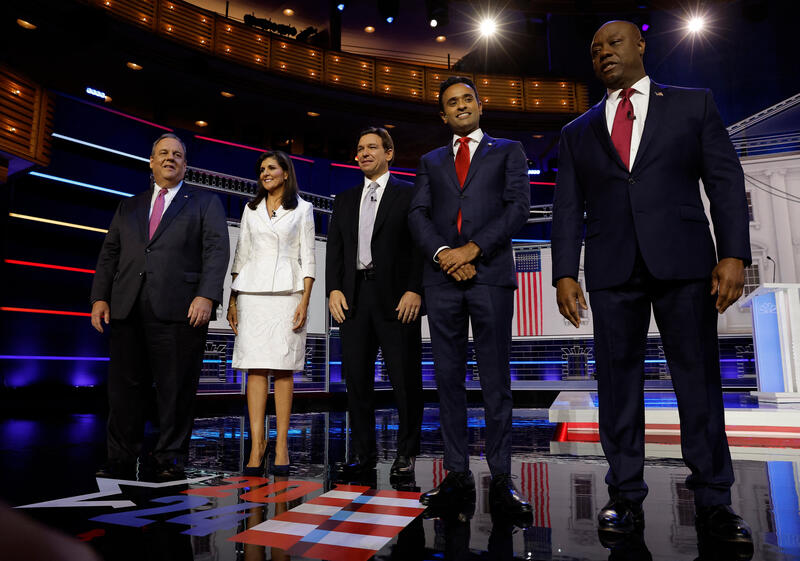China bashing loomed large at the third Republican Presidential debate Nov. 8 in Miami Florida, setting off fears of a fresh wave of anti-Asian American hate crimes.
“We have significant concerns about the 2024 election in the current political landscape, and believe hate crimes and incidents will continue to be an issue,” Manjusha Kulkarni, co-founder of Stop AAPI Hate, told Ethnic Media Services. The web portal, which allows victims to report hate attacks or incidents in one of several Asian languages, has logged over 11,500 reports since its inception in March, 2020.
Candidates on the debate stage included Florida Governor Ron DeSantis, former South Carolina Governor Nikki Haley, South Carolina Senator Tim Scott, former New Jersey Governor Chris Christie, and biotech entrepreneur Vivek Ramaswamy. Noticeably absent was former President Donald Trump, who also skipped two previous debates but remains the front runner for the Republican nomination.
Land Bans
All candidates onstage called for decoupling the US-China trade relationship.
“We need to get serious about the top threat that this country faces, which is the Chinese Communist Party,” declared DeSantis. “I banned China from buying land in this state. We’ve recognized the threat and we’ve acted swiftly and decisively.”
Notably, the two Asian American candidates onstage were the most vocal in their anti-China rhetoric.
“No more sales of our American soil to China. Let’s take back what they’ve already stolen,” said Haley, tacitly expressing her support for legislation in several states which would ban Chinese nationals from purchasing land. “Then we will go and end all formal trade relations with China until they stop murdering Americans with fentanyl,” she stated.
Taiwan Conflict
Haley also noted that the US military is currently under-equipped to take on an armed conflict with China if it invades Taiwan. Chinese Premier Xi Jinping has expressed his interest in “reunifying” Taiwan with China sometime over the next four years.
“China has the largest naval fleet in the world. They have 350 ships. They’ll have 400 ships in two years. We won’t even have 350 ships in two decades. China has built up their military. It’s not just land, air and sea: they’re doing cyber, they’re doing artificial intelligence. They’re doing space.”
“America needs to modernize our military,” said Haley, who is currently tied with DeSantis for second place in several polls.
China Dependence
“Here’s the dirty little secret. Our actual defense industrial base depends on China for the supply chain, for the fighter jets, for the ships that we’re building,” said Ramaswamy. “We depend on them for pharmaceuticals, just like we depend on them for semiconductors. So here’s why we can’t get tough with China. It’s because we depend on them for our modern way of life.”
“We have to declare economic independence from our enemy,” he stated.
TikTok
Much of the debate focused on the social media app TikTok, which is owned by the Chinese company ByteDance. Candidates accused TikTok of spying on Americans, particularly young people, with whom the app is extremely popular.
“TikTok is not only spyware, it is polluting the minds of American young people all throughout this country, and China is doing it intentionally,” said Christie. “This is China trying to further divide the United States of America.”
“If you cannot ban TikTok, you should eliminate Chinese presence on the app,” stated Scott. “I think it’s incredibly important for us as Americans to take back control of our information, especially of our kids. Where does it go? We should know that,” he said, calling for parental consent for all users under the age of 14.
Restrict Act
Sen. Mark Warner, D-Virginia, introduced the RESTRICT Act earlier this year, which would impose limitations on the kind of data that Chinese companies could collect on social media apps.
Warner, who is chair of the Senate Intelligence Committee, told reporters at an Ethnic Media Services news briefing that Chinese engineers have access to the data of millions of American users. He worries the CCP could use that data as part of misinformation and propaganda campaigns, or even to blackmail Americans.
John Yang, President and Executive Director of Asian Americans Advancing Justice — AAAJ-AAJC — said at the briefing that Asian Americans could become targets of anti-Chinese sentiment.
Lawmakers are promoting the false narrative that everything Chinese is threatening. “It is our community that often pays the price for their reckless rhetoric,” said Yang.
EMS’ Stop The Hate initiative is made possible with funding from the California State Library (CSL) in partnership with the California Commission on Asian and Pacific Islander American Affairs (CAPIAA). The views expressed on this website and other materials produced by EMS do not necessarily reflect the official policies of the CSL, CAPIAA or the California government. To report a hate incident or hate crime and get support, go to CA vs Hate.





